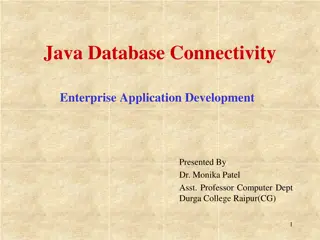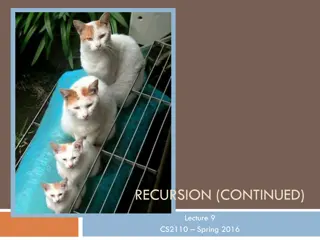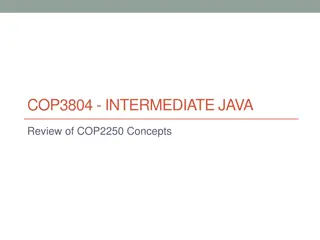Based on the given content, here are the requested details: "Java 15 - Static vs Non-static Design Patterns and Singleton Pattern Exploration
This presentation delves into Java 15 concepts, focusing on static vs non-static design patterns and the Singleton pattern in software engineering. Explore the implementation and advantages of Singleton pattern to ensure classes have only one instance. Dive into small, well-defined aspects of computer program functionality and code writing. Uncover the significance of global access and unique instances within your Java applications.
Uploaded on Mar 10, 2025 | 2 Views
Download Presentation

Please find below an Image/Link to download the presentation.
The content on the website is provided AS IS for your information and personal use only. It may not be sold, licensed, or shared on other websites without obtaining consent from the author.If you encounter any issues during the download, it is possible that the publisher has removed the file from their server.
You are allowed to download the files provided on this website for personal or commercial use, subject to the condition that they are used lawfully. All files are the property of their respective owners.
The content on the website is provided AS IS for your information and personal use only. It may not be sold, licensed, or shared on other websites without obtaining consent from the author.
E N D
Presentation Transcript
Agenda Agenda Static vs non static Design Pattern Singleton
Static Static Static = Static = Object Object
Design Pattern Design Pattern In software engineering, a design pattern describes a relatively small, well- defined aspect (i.e. functionality) of a computer program in terms of how to write the code.
Singleton Pattern Singleton Pattern Ensure a class has only one instance, and provide a global point of access to it.
Singleton Pattern Singleton Pattern public public class private private static private private Singleton() {} class Singleton Singleton { static volatile volatile Singleton instance = null null; public public static if if (instance == null synchronized synchronized(Singleton.class) { if if (instance == null instance = new } } } return return instance; } } static Singleton getInstance() { null) { null) { new Singleton();























